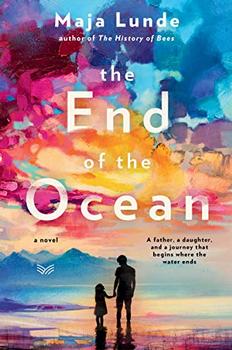Summary | Excerpt | Reviews | Beyond the Book | Readalikes | Genres & Themes | Author Bio

The camp consisted of some huge old warehouses spread out across a flat field. Big trees cast shadows. They still had leaves; the roots must go deep. A sign on the wall informed us that the place had once been an awning factory. Sunshades for All Your Needs, it read. No doubt they'd done good business.
We continued walking in through the camp. Between the buildings were a dozen or so military tents and just as many barracks. They were set up in straight lines and all of them had solar cells on the roof. There was no trash anywhere. People sat here and there, resting in the heat. Everyone was clean and wore clean clothes.
Anna had been right: this was a good place.
"There," I said, pointing to a flag that was flapping on the roof of a barracks a short distance away.
"What country is that from?" Lou asked.
"It's not a country, it's the Red Cross. They know where Mommy and August are."
"Do they?"
"Yes."
Lou held my hand, with her dirty, sticky child's hand. Anna used to nag her about washing her hands. The same ritual took place before every meal. Remember to wash your hands, remember the germs. If she could see Lou now.
We turned a corner, and Lou came to an abrupt halt.
"A line," she said softly.
Damn.
"We're good at that," I said, trying to make my voice sound cheerful.
During the past year everything was rationed. We stood in lines for a gallon of milk. For a cut of meat. For a bag of apples, every other kind of fruit. The lines for fruits and vegetables were the longest. There were so few bees, so few insects. They had disappeared gradually, but when the drought came, it accelerated. No insects, no fruit. I missed tomatoes. Melons. Pears, plums. Digging my teeth into a juicy plum, cold from the refrigerator ...
Lou couldn't remember a life without lines. And she was the one who had come up with the idea that we could sit in line, instead of standing in line.
The first time she sat down, it was from sheer exhaustion. She was whining. On the verge of tears. But when I sat down beside her and said we were on a picnic, she laughed.
Sitting in line had now become routine for us. The lines were a place for games. Outings in the country. School. Dinner parties. There were especially a lot of the latter. Lou loved games about eating.
I gave Lou a cookie, the last one I had in my bag. She crunched on it and smiled.
"There's like a yellow cream inside," she said, showing me the dry, grainy cookie.
We kept playing through the first course, the main course, dessert, and cheese. For a few moments I managed to think only about the game.
But mostly I looked for Anna. Waited. She could appear at any moment. Walk toward me with August in her arms. He would smile with his mouth open, showing his four teeth. And she would hold him out to me so I could take him, hold him, while she hugged me. Lou would also join in. All four of us would stand like that, together.
Then the door to the barracks opened and it was our turn.
The floor was clean; it was the first thing I noticed. A hard, wooden floor, without a speck of dust. There were several cables coiling across the barracks floor. And it was cooler in here. A fan on the wall droned loudly.
A woman who was half-hidden behind the monitor of a desktop computer smiled. She pointed to two chairs in front of the desk.
I quickly explained our case: that the family had been split up when we left the south, but that we had agreed to meet here. "It was my wife's suggestion," I said. "She wanted us to come here."
The woman started typing on the computer. She asked for the names and birthdates of both Anna and August and asked what they looked like.
"Look like?"
"Do they have any special characteristics?"
"No ... Anna has brown hair. She is quite short." It suddenly sounded like I thought there was something wrong with her. "I mean ... relatively short. Five foot two, I think. And pretty," I hastened to add.
Excerpted from The End of the Ocean by Maja Lunde. Copyright © 2020 by Maja Lunde. Excerpted by permission of Harper Via. All rights reserved. No part of this excerpt may be reproduced or reprinted without permission in writing from the publisher.




To be ignorant of what occurred before you were born is to remain always a child
Click Here to find out who said this, as well as discovering other famous literary quotes!
Your guide toexceptional books
BookBrowse seeks out and recommends the best in contemporary fiction and nonfiction—books that not only engage and entertain but also deepen our understanding of ourselves and the world around us.